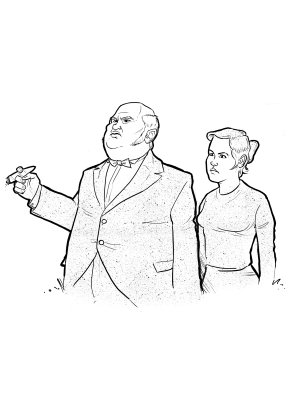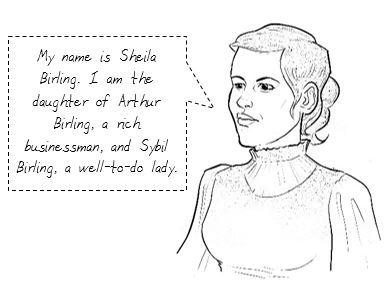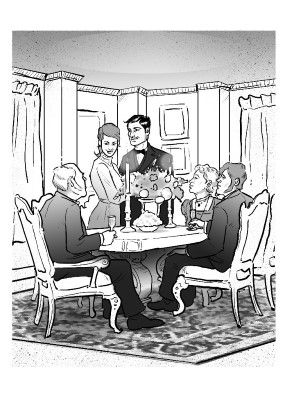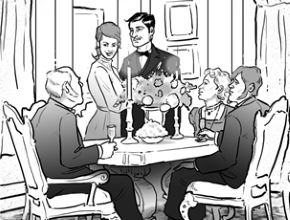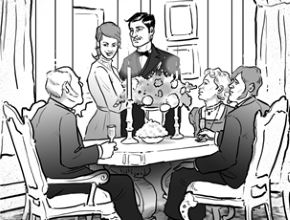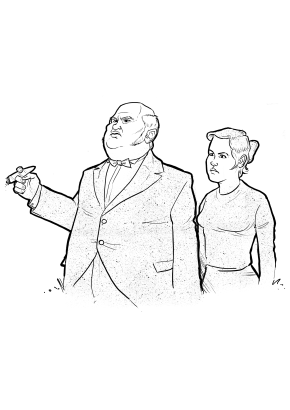
Priestley, J B
John Boynton Priestley was born as ‘John Priestley’ in 1894, choosing later to add ‘Boynton’ to his name. The First World War broke out in 1914, when Priestley was just 20 years old. By this time he had already discovered his love for literature and was a promising young writer with a column in his local newspaper and a number of published political articles under his belt.However, he set all of this aside and voluntarily joined the army to fight for his country. In 1915, just one year later, he was sent to the front line. Here he experienced the full hell of war, and saw many of his comrades killed. After being seriously injured he was sent home to recover, but when he was well enough he was sent back to the front line in 1917 and survived being gassed by poison gas.
He was 45 when the Second World War broke out in 1939, and he didn’t fight in it. However, he was very politically active throughout the war, and claimed that society needed to change if it was to avoid another war. Priestley is often labelled a ‘socialist’ and he was, indeed, involved in socialist movements and was a founder of CND (the Campaign for Nuclear Disarmament). However, his feelings were complex and he did not think that socialism was the answer to everything.
J B Priestley wrote An Inspector Calls in 1945, the year that saw the Second World War come to an end. Not surprisingly, the central theme of the play is war. Although the play is written in 1945, it is set in 1912. All the action of the play occurs just two years before the First World War breaks out. By choosing to set the play in this period, J B Priestley can write about the attitudes of a typical upper-middle-class British family in pre-war England, and use them to reflect the broader attitudes of British society.
Priestley died in 1984 at the height of the Cold War, a period of tension between the West and the Soviet Union, when the threat of a nuclear conflict seemed very real, and several hundred female CND supporters were encamped at Greenham Common in protest against the nuclear missiles stored there. His ashes are scattered in a churchyard in Yorkshire, where his family had its roots.
© ZigZag Education 2026: content may be used by students for educational use if this page is referenced.
Show / hide details
| 1894 |
Born
|
|
| 1896 |
Mother died
|
|
| 1910 |
Left school
|
|
| 1910–1914 |
Worked as a clerk and started writing
|
|
| 1914 |
Joined the British Army during World War I
|
|
| 1916 |
Injured in France
|
|
| 1918 |
Returned to fight in France
|
|
| 1919–1921 |
University education
|
|
| 1921 |
Married first wife, Emily
|
|
| 1925 |
First wife, Emily, died
|
|
| 1926 |
Married second wife, Jane
|
|
| 1929 and 1930 |
First literary successes
|
|
| 1932 |
First theatrical success
|
|
| 1938 |
First television broadcast of a live play
|
|
| 1940–1941 |
Wartime broadcasting
|
|
| 1942 |
Co-founded the Common Wealth Party
|
|
| 1945 |
An Inspector Calls first performed
|
|
| 1953 |
Married third wife, Jacquetta
|
|
| 1958 |
Co-founded CND |
|
| 1973 |
Honoured by Bradford
|
|
| 1975 |
Honoured by Bradford University
|
|
| 1984 |
Died
|
|
| 1986 |
Statue presented to Bradford
|
Acknowledgements
Public Domain image from https://commons.wikimedia.org/wiki/File:J._B._Priestley_(cropped).jpg



